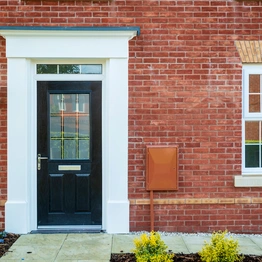Short-term Home Insurance
If your home is going to be unoccupied for an extended period of time, short-term home insurance is there to give you the cover you need.

Why choose Howden for Short-term Home Insurance?
When it comes to arranging your home insurance, we at Howden, as insurance brokers, pride ourselves on doing the heavy lifting, so you don’t have to. The fantastic relationships we have with our selected panel of specialist and standard home insurers allows us to make comparing multiple policies, on your behalf, simple and easy, which then makes comparing multiple policies, on your behalf, simple and easy. What’s not to like?
We also provide a personalised service, because we know that each policy needs to be as individual as its owner. This is why we get to know you, to find out exactly what you need from your home insurance and guide you through the process, getting to know you and finding out exactly what you want from your home insurance.
Ultimately, whether you need to make a claim, purchase a new home policy, or renew an existing one, we’re here to help.
Benefits of working with us:
- You can trust us – we’re rated Excellent on Trustpilot.
- We’re driven to save you time, money, and hassle.
- Benefit from a tailored service that comparison sites can’t provide.
- Speak with your local branch, within your community.
- We’re right by your side in the event of a claim.
Can you buy short-term house insurance?
Yes, you can buy short-term house insurance in the UK. This type of insurance is also known as short-term buildings insurance, temporary home insurance, or unoccupied house insurance. We're able to source cover for when your property is left for at least 90 days. So if you’re wondering, “Can I insure a house for 3 months?” or “Can I get 6 months of house insurance?”, you certainly can.
If you are going away for 90 consecutive days or more, however, or if there’s another reason why your house is likely to be empty for an extended period of time, speak to your insurer about short-term home insurance. It will provide you with the proper protection while your home is unoccupied.
It's important to note that short-term policies may have different terms and conditions than standard home insurance policies. And the coverage and cost can vary depending on your insurer and your specific circumstances.
How does short-term home insurance work?
Short-term home insurance works similarly to standard home insurance, though there are some key differences:
- Duration: Unlike annual policies, short-term insurance covers a specific, limited period. This typically ranges from a 3 months to a limit of 12 months.
- Flexibility: These policies are designed to be more flexible, allowing you to choose the exact start and end dates you need.
- Coverage types: Like standard home insurance, you can choose between buildings insurance, contents insurance, or a policy that combines the two. Choose the option that’s right for you. For example, if your home is standing completely empty because you’re moving and have already put your belongings in storage, you’ll only need to protect the structure of your home, not its contents.
- Application process: It’s usually quicker and easier to apply for short-term home insurance than for annual policies. Many providers offer online applications with almost immediate coverage.
- Payment: Instead of monthly instalments, you typically pay a one-time premium for the entire duration of the policy.
- Risk assessment: Insurers may consider short-term policies higher risk, which can make them more expensive than standard policies.
- Renewals: Short-term home insurance policies typically don't auto-renew. You need to arrange new coverage when the policy ends. If you need to extend your policy, or cancel it early, you’ll need to contact your insurer.
- Limited additional options: You might have fewer add-ons available compared to annual policies.
When applying, you'll need to provide details about your property, its contents (if you need contents insurance), the reason why you need short-term coverage, and the exact dates.
When do you need Temporary Home Insurance?
Short-term house insurance can be useful in a number of situations. You’ll likely need it if:
- You’re doing substantial, long-term renovations that require you to move out
- You’ve moved a new home and are still waiting for your old house to sell
- You’ve bought a new house but you’re not quite ready to move into it yet
- You’re going on an extended holiday
- You’re planning to go a sabbatical or to volunteer abroad for a long time
- You’re a landlord and trying to find a new tenant
- You’re unwell and have had to move into a place that provides long-term healthcare
What does short-term home insurance cover?
As we’ve already mentioned, every insurance and policy is slightly different. Before you sign on the dotted line, make sure you’ve spoken to your insurer, or a broker like Howden, about your specific insurance needs.
Generally, short-term or unoccupied house insurance covers:
- Fire, flooding and storms: You’ll be paid out in the event that your home is damaged — partially or entirely — by a natural disaster.
- Theft and/or attempted theft: This covers you if someone breaks in or attempts to break into your home and steal your belongings.
- Vandalism: If your home is maliciously damaged in some way while it’s empty, your short-term insurance will cover the costs of these repairs.
- Water or oil damage: Burst pipes or leakages can cause extensive damage, especially if they aren’t repaired quickly.
- Car collisions or falling objects: While incidents like these are rare, they do happen. Your insurance will protect you in the event that a vehicle or aerial object unexpectedly collides with your home.
What isn’t covered?
Again, the exclusions that apply to your plan will depend on your particular insurer and policy, but typically, the following apply:
- Unforced entry: Insurers often don’t pay out if it can be proven that burglars or squatters were able to get into your property without forcing entry — if you left a door or window open, for example. Always ensure your home is secure.
- Contractors: Some insurers won’t cover you for damage that contractors cause while you’re conducting renovations. This is because they expect the contractors to have their own insurance in place. If you’re doing renovations, make sure you check your own policy in this regard, and confirm that your contractors have their own coverage.
- Major works: It’s also possible that your insurer won’t cover you if you’re doing major works. These are large one-off projects that are designed to either extend or improve your home. Chat to your insurer if you need this type of coverage, or to your contractor — they should have the protection required.
What factors affect the cost of short-term home insurance?
There’s no set cost for temporary home insurance. How much you pay will typically depend on the following:
- Duration: Generally, longer periods of time offer better value, though the overall cost will be higher than shorter periods.
- The type of property: Your home’s size, value, age, condition, and the construction materials it's made of will affect the price of your premiums.
- Its location: Insurers will consider local crime rates and environmental risks like flooding when they draw up your quote.
- The level of coverage you choose: Whether you opt for buildings, contents, or both, and any additional options, will affect the price.
- The purpose of the insurance: Are you conducting a renovation? Moving from one home to another? The reason behind the insurance can affect the cost.
- Security measures: Alarm systems and quality locks can positively affect your premiums.
- Your claims history: Your insurer will take into account any previous claims you’ve made on your property or on other policies you’ve held.
- High-value items: If you own high-value items like expensive electronics or jewellery, you’ll likely pay more for contents insurance.
- The excess you're willing to pay: Usually, a higher excess will result in lower premiums, though it’s important that you will be able to pay this excess in the event that you have to claim.
- Seasonal factors: It can be slightly more expensive to take out short-term insurance during the winter months, when there is a higher risk of weather-related damage.
If you’re looking for help in finding the short-term insurance policy that’s right for you, the experienced team at Howden is on hand to help. Get in touch with us today.
Related articles
Do you want to read more about home. landlord or other building-related insurances? Take a look at one of our Home Insurance Guides, or read any of the articles below from the Howden Blog!

Rated 'Excellent' on Trustpilot

500,000+ Protected Clients

Insuring for 30+ years

Insurance Broker of the decade
Home Insurance
Home Insurance to protect your dwelling
Trust Howden, a home insurance broker, to help you find a tailor-made home policy that meets your budgetary and insurance expectations.
Home Emergency Insurance
Keeping your home covered in case of an emergency
Have a problem in your home that needs fixing immediately? Look no further than a home emergency insurance policy to keep your home protected at all times.
Home Excess Protection
Protect your home insurance excess
Reimburse your excess and avoid being left out of pocket with home excess protection.
Second home insurance
Insurance that protects your second home, like a first home
Don’t neglect your second home, let us help you find our best available second home insurance, courtesy of our specialist panel of insurers.

